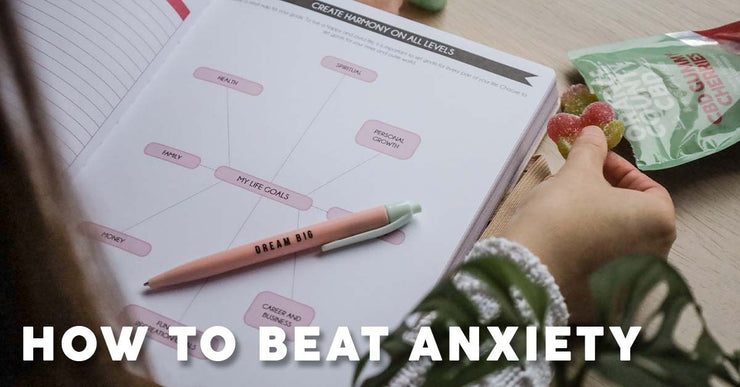How to beat anxiety


It’s very common for most people, if not everyone, to feel anxious from time to time. It’s a natural and normal reaction when there is uncertainty about what is coming or what might happen in the future. But is there a way to beat anxiety?

Anxiety can be felt about any number of different things and can be a real challenge to deal with. It can affect people in different ways, ranging from feeling very worried through to panic attacks that can result in physical symptoms like:
- Feeling dizzy, faint or lightheaded
- Feeling the heartbeat race
- Perspiring, shaking or trembling
- Difficulty catching breath or increased breathing rate
- Feelings of losing control
- Nausea
- Tingling sensations in the lips or fingers
Feeling anxious every now and again doesn’t necessarily mean that you have an anxiety disorder, but those who find that feeling anxious is stopping them from carrying on with normal daily life, is affecting sleep or monopolising thoughts for long periods of time, might be suffering from a recognised anxiety-related condition.
Research shows that in any given week, eight in every 100 people in England will experience some kind of anxiety disorder.
If this sounds like you, it’s important to seek professional medical advice as you may benefit from treatment that can be prescribed to you.
But for those who can feel anxious at times, we’ve compiled some tips for helping to counteract anxiety.

Check the how rational your anxious thoughts are
If you’re starting to feel anxious about something, you can ask yourself these questions:
- How likely is the thing I’m anxious about to actually happen, on a scale of 0-100?
- What reason or reasons do I have for thinking something will go wrong?
- Could I potentially be overly worried about this?
By thinking about why you’re feeling anxious, rather than trying to avoid the thoughts altogether, it can sometimes help you approach your thoughts more calmly.
Assess the level of threat
Feeling anxious can bring a level of fear for your safety or the safety of others as your mind jumps to what could potentially go wrong. Taking a few moments to ask yourself about the threat level right at that instant can help reassure you that you or the other person are currently safe and in no immediate danger, which can help to ground your thoughts in some cases.
Share your anxiety with a trusted friend or family member
It can be difficult to let someone know that you’re struggling with anxious thoughts, but many people find that talking through their worries with someone they trust can help put the thoughts into perspective.

Do some breathing exercises
Doing some calming breathing exercises can help to reduce the urgency or panic that can accompany anxious thoughts, and are often most beneficial when done daily for around three to five minutes, regardless of whether you’re feeling anxious at the time or not.
- You can try breathing in through the nose and out through the mouth
- Breathe in gently for a count of four, then out for the same count. You may want to increase this to a count of five after a few breaths
Find another outlet for nervous energy
If your anxiety is causing you to be restless, with lots of pent-up energy, it can sometimes be helpful to redirect that into a more positive activity, such as a short burst of exercise, even going outside for a quick walk around the block.
Activities such as running, swimming and yoga can also be very relaxing and take your mind off the anxiety to give your mind a break and help you come back to it with a calmer outlook.
Give your anxious thoughts a dedicated time slot in your day
Trying to avoid your anxious thoughts completely is rarely successful, so you can try giving yourself a 15-minute time slot during the day to let your mind go where it will.
Once the time slot is over for the day, you can push back anxious thoughts that try to appear until the next slot on the following day.

Eat a healthy diet with regular meals
Sometimes taking notice of what you’re eating can be last on the list of priorities if you’re feeling anxious, but a good balanced diet and regular meals can make a big difference to how you feel and in stabilising energy levels.
Anxiety can feel very intrusive and stop you from enjoying life, from sleeping well and taking part in many activities.
If you feel that your anxious thoughts are getting in the way of normal life then you should speak to your GP.
Sustainability